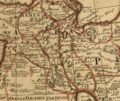| Author | Sharaf Khan Bidlisi |
|---|---|
| Language | Persian |
| Genre | History |
| Publication date | 1597 |
| Publication place | Safavid Iran |
| Media type | Print (Hardback & Paperback) & Audio book |
| OCLC | 55981507 |
The Sharafnama (Kurdish: شەرەفنامە Şerefname, "The Book of Honor", Persian: Sharafname, شرفنامه) is a book written in 1597 by Sharaf al-Din Bitlisi (a medieval Kurdish historian and poet) (1543–1599) in Persian. Sharafnama is regarded as an important, and the oldest, source on Kurdish history. It deals with the different Kurdish dynasties such as, Saladin the Great and his Ayyubid Dynasty, ancient and Medieval Kurdish principalities in the Middle-East and the Caucasus, as well as some mentioning about the pre-Islamic ancestors of the Kurds.
History
Although the Sharafnama is a work of Kurdish history, it was written in Persian. Given the context of Sharaf Khan's time, this choice was, in a sense, inevitable. After his father, Shams al-Din Khan, sought refuge at the court of Safavid Shah Tahmasp I (r. 1524-1576), it is not surprising that Sharaf Khan, who received a high-quality education alongside the princes in Shah Tahmasp’s palace in Qazvin and mastered Persian like a native speaker, chose to write this work in that language. His decision was driven both by the desire to reach a wide audience across the Persian-speaking regions and to enhance his dynasty’s legitimacy in the broader world. Upon completing his book, Sharaf Khan sent copies to the Kurdish leaders of Kilis (Husayn Jānbūlād) and Ardalan (Halo Khan). This gesture could have been aimed at demonstrating the Bidlis ruler’s dynastic authority and gaining broader recognition, while also indicating that Persian was read and written in the courts of other Kurdish rulers.
Translations
In 1873–1875, François Charmoy, a French scholar, translated it from Persian into French and published it in Saint Petersburg, Russia. At the right, it is a Kurdish–French dictionary, made by Alexandre Jaba, and published in 1879 in Saint Petersburg, too. The Sherefname has been translated into the languages German, Arabic, English, Ottoman, Russian, and Turkish. In 1972 the Kurdish scholar Abdurrahman Sharafkandi, translated the book from Persian into Kurdish.
Gallery
-
 State of Ardalan
State of Ardalan
-
 Kurdistan as a province in Persia
Kurdistan as a province in Persia
-
 Sharaf Khan Bidlisi
Sharaf Khan Bidlisi
-
 Frederick II, Holy Roman Emperor (left) meets Al-Kamil of Ayyubid (right).
Frederick II, Holy Roman Emperor (left) meets Al-Kamil of Ayyubid (right).
-
 Battle of Hattin
Battle of Hattin
See also
References
- ^ Aktürk, Ahmet Serdar (2018). "Family, Empire, and Nation: Kurdish Bedirkhanis and the Politics of Origins in a Changing Era". Journal of Global South Studies. 35 (2): 393. doi:10.1353/gss.2018.0032. ISSN 2476-1419. S2CID 158487762 – via Project MUSE.
- Genç, Vural (2024). "The Cultural Impact of the Persian Language in and around Bidlis". Iranian Studies. 57 (1): 38. doi:10.1017/irn.2023.61.
- ^ "The Sharafnama of Bitlisi: manuscript copies, translations and appendixes – KURDISTANICA". Retrieved 2020-01-26.
Further reading
- Alsancakli, Sacha (2015). "From Bidlīs to Ardabīl Via Aleppo and Iṣfahān: On the Circulation of a Manuscript of Šaraf Ḫān Bidlīsī's Šarafnāma Revised by the Author (1007/1599)". Eurasian Studies. 13 (1–2): 133–152. doi:10.1163/24685623-12340007.
